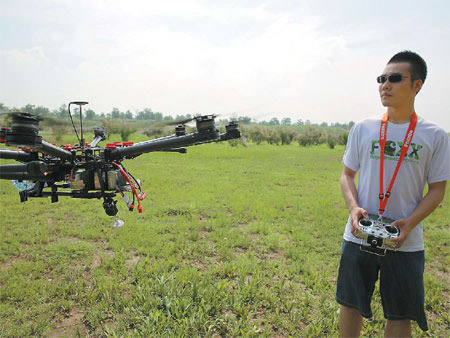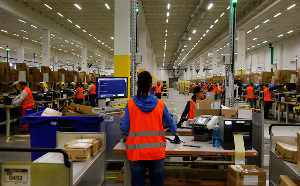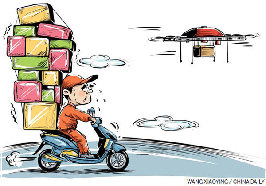 |
|
Aerial photographer Jin Xing uses a civilian drone to snap pictures from the sky via remote control. "Flying has been a perennial dream of humanity," Jin says. Provided to China Daily |
Jin Xing isn't your average shutterbug. His camera of choice operates via remote control and is capable of capturing images 1,000 meters above ground.
Jin is part of a new class of aerial photographers in China who are using civilian drones to snap pictures from the sky. Once seen as just high-tech toys, unmanned aerial vehicles are now part of a budding industry that is as futuristic to Chinese people as Google Glass.
"Generally speaking, the Chinese public has been freethinking and re-assessing drone technology at a considerable pace since the late 2000s," says the 23-year-old, who began using UAVs around 10 years ago. "The knowledge base in China about drones has matured rapidly thanks to the appearance of drone-related applications."
The Beijing native credits his father, Jin Mingjie, for sparking his interest in UAVs. Jin Mingjie began using UAVs in the 1980s, when the mainstream models were simple ethanol-burning, fixed-wing gliders. Jin Xing says his father also tinkered with car and boat models as a teenager but eventually dedicated all of his time to aero-modeling.
"Flying has been a perennial dream of humanity," Jin Xing says.
"The opportunities in the field of aero-modeling, as opposed to cars or boats, are versatile, and the experience of flying a UAV is far more of an adrenaline rush. The sky is the limit, which is limitless after all."
Jin put his first UAV - a vintage ethanol-fueled helicopter - into the air when he was a student at the High School Affiliated to Beihang University. The helicopter, a Golden Star P3A-1 model, made its maiden flight at Bei'anhe Airport, a facility in northwestern Beijing for small fixed-wing aircraft and helicopters.
Jin's passion for UAVs grew during his time at Beijing Union University, which is known for its mechanical engineering program. He graduated with a bachelor's degree in electrical automation and specialized in automated intelligence and electrical circuit integration - technology that is essential for building a smart and reliable drone.
Around two months ago, Jin opened his first business, Butterfly Aerial Photography Workshop. Jin and his business partner, Li Yu, use drones to take aerial photos for companies. Jin and Li became friends during middle school, when they both were members of the school's aero-modeling team.
Jin operates the business from his home. Inside his living room, six helicopters that he assembled are on display inside a glass case, caked in a thin layer of dust. Jin says he seldom fiddles with these old-time aircraft nowadays because his focus has shifted from helicopter UAVs to drones.
Jin bought the first drone for his business, a DJ S-1000 model, from Dajiang, a leading drone manufacturer on the mainland. Jin handles the mechanical aspects of the drones, from precalibrating the propellers to making sure the controls are functioning properly.
He uses a remote control to operate the drone and track its movements. Li, an avid photographer, is responsible for capturing the images. He uses a separate remote control to position a camera mounted on the drone.
"Teamwork is another challenging part of drone flights. I know much more about UAVs than photography, and Li Yu is exactly the opposite," Jin says. "To make our aerial shots stable, we need to have a kindred rapport."
Jin says his dream is to fly a drone over Marum, an active volcano on the remote island of Ambrym, in the South Pacific nation of Vanuatu. Even for experienced photographers, capturing a panoramic shot over an active volcano is a challenge. Jin hopes to accomplish that one day, but says he must first learn how to cope with the acid rain and high temperatures.
Jin plans to work with drones for the rest of his life, but he says there are some dangers involved with the machines.
Besides privacy concerns and air-traffic problems, Jin says the drones can cause serious damage if they are not operated properly. The drones' location is monitored via a satellite signal. If that signal is lost, the person on the ground controlling the drone can lose control of it, Jin says.
Jin hasn't had any accidents since he started his business. "The drone community has a belief that everyone is responsible for their actions," Jin says, adding that it's the most important lesson he has learned.
"Drone flying does not allow you to have any safety lapses whatsoever."
 |
 |
